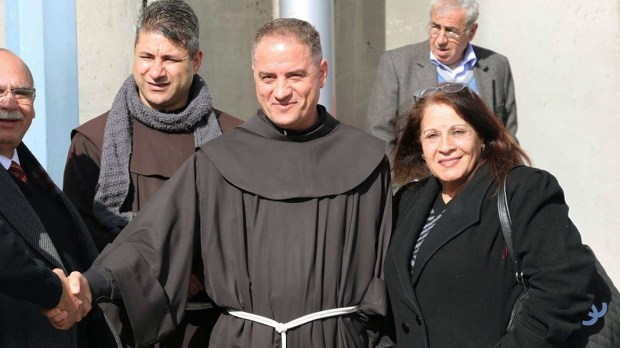Abuna Nirwan is a Franciscan priest, originally from Iraq, who studied medicine before being ordained.
In 2004, while he was living in the Holy Land, the Dominican Sisters of the Rosary, founded by Maria Alphonsine Danil Ghattas (a Palestinian woman beatified in 2009 and canonized in 2015), gave him a relic of their founder and a rosary she had used. Fr. Nirwan always carries them with him.
In 2013, when Benedict XVI requested the investigation of a miracle for Maria Alphonsine’s canonization, the Holy See ordered as customary that the nun’s cadaver be exhumed. As usual, it fell to the local bishop to designate a doctor to preside over the procedure. Fr. Abuna Nirwan was asked to carry out the exhumation and to draw up the corresponding medical report.
Two years before her beatification, something truly extraordinary had happened through her intercession—besides the approved miracle—as recounted by Fr. Santiago Quemada on his blog, A priest in the Holy Land:
“The story we are going to tell took place on July 14, 2007. Abuna Nirwan went to visit his family in Iraq. He went in a taxi that he hired on the Syrian border. He told the story himself during the homily of a Mass he celebrated in Bet Yalla”:
At that time it wasn’t possible to travel by airplane to see my family. It was forbidden. The only means of transportation was a car. My plan was to arrive at Baghdad, and go from there to Mosul, where my parents lived. The driver was afraid, because of the situation in Iraq during that period. A family—a father, a mother, and a 2-year-old girl—asked us if they could travel with us. The taxi driver told me that they had asked, and I had no objections. They were Muslims. The driver was a Christian. He told them that there was room in the car, and that they could come with us. We stopped at a gas station, and another young Muslim man asked if he could go to Mosul. There was still room, so we accepted him. The border between Jordan and Iraq doesn’t open until sunrise. When the sun came up, the barrier was opened, and about 50 or 60 cars started to form a line, all driving together slowly. We continued our trip with determination. After more than an hour in the car, we arrived at a place where there was a checkpoint. We prepared our passports. We stopped. The driver said, “I’m afraid of this group.” Before, it had been a military checkpoint, but members of an Islamist terrorist organization had killed the soldiers and taken control of the place. When we arrived, they asked for our passports, and they made us get out of the car. They took the passports to their office. The man came back, turned to me, and said, “Father, we are going to continue with the investigation. You can go to the office further on. Beyond that is the desert.” “Very well,” I answered, “if we have to go, we will.” We walked for about a quarter of an hour until we arrived at the shack they indicated to us. When we arrived at the cabin, two men came out with their faces covered. One was carrying a camera in one hand and a knife in the other. The other was bearded, and was carrying the Koran. They came up to where we were, and one of them asked me, “Father, where are you coming from?” I told him I was coming from Jordan. Then, he asked the driver. Next, it was the turn of the young boy who had come with us; the man grabbed him and pinned his arms behind him, and killed him with the knife. They tied my hands behind my back. Then, he said, “Father, we are recording this for Al Jazeera. Do you want to say a few words? Please, no more than a minute.” I said, “No, I just want to pray.” They gave me a minute to pray. Afterwards, he pushed down on my shoulder until I was forced to kneel, and he said, “You are a priest, and it is forbidden for your blood to fall on the ground, because it would be a sacrilege.” So he went to grab a bucket, and came back with it, to slit my throat. I don’t know what I prayed at that moment. I was very afraid, and I told Marie Alphonsine, “It can’t be by chance that I’m carrying you with me. If it is necessary that the Lord take me while I’m young, I’m ready, but if not, I ask you that no one else die.” He grabbed my head with his hand, held my shoulder tightly, and lifted the blade. There were a few moments of silence, and then suddenly he said, “Who are you?” I answered, “A friar.” He answered, “And why can’t I bring the knife down? Who are you?” And then, without letting me answer, he said, “Father, you and the others—go back to the car.” We went back to where the car was. From that moment on, I have stopped being afraid of death. I know that I’ll die someday, but now I understand better that it will happen only when God wants it to. Since then, I’m not afraid of anything or anyone. Whatever happens to me will be because it’s God’s will, and He will give me the strength to carry His Cross. What matters is to have faith. God takes care of those who believe in Him.
Article originally published by Religión en Libertad, and translated and adapted from Aleteia’s Spanish edition.

